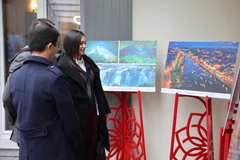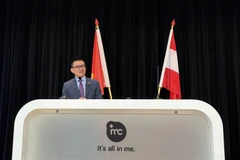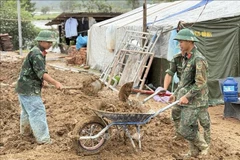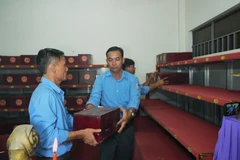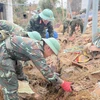Shops on Le Duc Tho street arepacked with people at the weekends. The shops, which normally onlyconsist of colourful plastic chairs and tables, are now equipped withmodern projectors, huge speakers, wide screens and microphones, allvital components of a lively karaoke stage.
Customers taketurns to use a remote control to select songs or at some venues, theywrite the names of the songs that they wish to sing on a list, just likein any karaoke bar. While one customer sings, the rest of the customerssing along or clap their hands to the music.
"It feltgreat because I was like a real singer on a stage," said Tong Thi TuNgan, a senior student from the Labour and Social AffairsUniversity . "Singing in traditional karaoke bars is nothing new, butthis is different and it's cheap too," she added.
Customers at these venues only have to pay for their drinks which rangefrom 10,000 to 15,000 VND each (0.5-0.75 USD), but get to sing for free.Sometimes they might have to pay an extra fee of 10,000 or 20,000 VND(0.5-1 USD) for the night, but it's still much cheaper than a regularkaraoke bar.
The original idea for the service came abouttwo months ago at the end of the World Cup. "During the World Cup, toattract more customers, I bought a projector and a screen to show thegames. When the competition was over, we thought why not get loudspeakers and turn it into a karaoke service, instead of letting theprojectors sit wastefully in storage," said Nguyen Thi An, a shop owner.
Other owners who can't afford the equipment, rent it foraround 400,000-500,000 VND (20-25 USD) per night to keep up with thecompetition.
As the craze has grown in popularity,residents in the local area have started to complain about the noise."Singers get the most excited from 9-10pm. The music is so loud that wecan't get any sleep," said a resident who wished to remain anonymous."We reported it to local authorities but it seems that they haven't gotinvolved," he said.
Deputy head of the Culture andTourism Department Nguyen Duc Hoa said his department plans to inspectthe venues. "If they violate regulations, they will be fined," he said.
Vu Xuan Thanh, chief inspector of the Ministry of Culture, Sports andTourism said however, this is a new kind of business and has not beenaccounted for in any laws. "But there is a regulation for karaoke barsthat says they have to be sound proof, include a fire prevention systemand be larger than 20 square metres," he said.
Thanh added that any karaoke business has to be approved by authorities under the regulation.
"Even though many shop owners do not charge customers for the karaokeservice, they still have to follow the regulations, otherwise they willbe punished," he said./.



